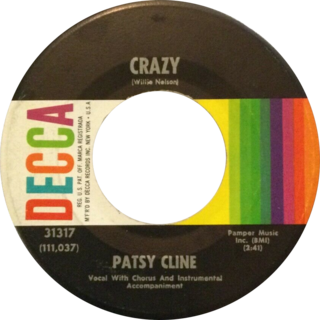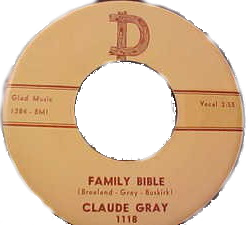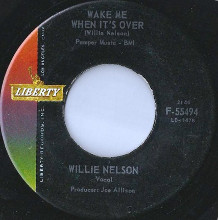
Willie Hugh Nelson is an American country singer, guitarist and songwriter. He was one of the main figures of the outlaw country subgenre that developed in the late 1960s as a reaction to the conservative restrictions of the Nashville sound. The critical success of his album Shotgun Willie (1973), combined with the critical and commercial success of Red Headed Stranger (1975) and Stardust (1978), made Nelson one of the most recognized artists in country music. Nelson has acted in over 30 films, co-authored several books, and has been involved in activism for the use of biofuels and the legalization of marijuana.

Red Headed Stranger is the eighteenth studio album by American outlaw country singer Willie Nelson, released in 1975. Following the success of his recordings with Atlantic Records, coupled with the negotiating skills of his manager, Neil Reshen, Nelson signed a contract with Columbia Records, the label that gave him total creative control over his works. The concept for the album was inspired by the "Tale of the Red Headed Stranger", a song that Nelson used to play as a disc jockey on his program in Fort Worth, Texas. After signing with Columbia, he decided to record the song, and arranged the details during his return to Austin, Texas, from a trip to Colorado. It was recorded at low cost at Autumn Sound Studios in Garland, Texas. The songs featured sparse arrangements, largely limited to Nelson's guitar, piano, and drums. Nelson presented the finished material to Columbia executives, who were dubious about releasing an album that they at first thought was a demo. However, Nelson had creative control, so no further production was added.

"Crazy" is a song written by Willie Nelson and popularized by country singer Patsy Cline in 1961. Nelson wrote the song while living in Houston, working for Pappy Daily's label D Records. He was also a radio DJ and performed in clubs. Nelson then moved to Nashville, Tennessee, working as a writer for Pamper Music. Through Hank Cochran, the song reached Patsy Cline. After her original recording and release, Cline's version reached number two on Billboard's Hot Country Singles, also crossing to the pop chart as a top 10 single.

Stardust is the 22nd studio album by Willie Nelson, released in April 1978. Its ten songs consist entirely of pop standards that Nelson picked from among his favorites. Nelson asked Booker T. Jones, who was his neighbor in Malibu at the time, to arrange a version of "Moonlight in Vermont". Impressed with Jones's work, Nelson asked him to produce the entire album. Nelson's decision to record such well-known tracks was controversial among Columbia executives because he had distinguished himself in the outlaw country genre. Recording the album took only ten days.

Shotgun Willie is the 16th studio album by American country music singer-songwriter Willie Nelson, released on June 11, 1973. The recording marks a change of style for Nelson, who later stated that the album "cleared his throat". When Nelson refused to sign an early extension of his contract with RCA Records in 1972, the label decided not to release any further recordings. Nelson hired Neil Reshen as his manager, and while Reshen negotiated with RCA, Nelson moved to Austin, Texas, where the ongoing hippie music scene at the Armadillo World Headquarters renewed his musical style. In Nashville, Nelson met producer Jerry Wexler, vice president of Atlantic Records, who was interested in his music. Reshen solved the problems with RCA and signed Nelson with Atlantic as their first country music artist.

Yesterday's Wine is the 13th studio album and a concept album by country singer Willie Nelson. Nelson had been recording for RCA Victor since the early 1960s, and had released no significant hit records. By 1970, his recordings had reached mid-chart positions. Nelson lost the money he made from his song-writing royalties by financing concert tours that were generally unsuccessful and unprofitable. In addition to problems with his music career, Nelson had a troubled personal life. He had divorced his wife, Shirley Collie, and his Tennessee ranch had been destroyed by a fire.

The Party's Over and Other Great Willie Nelson Songs is the sixth studio album by country singer Willie Nelson.

Country Willie: His Own Songs is the third studio album by country singer Willie Nelson. This was Nelson's third album, his first for RCA Victor.

...And Then I Wrote is the debut studio album by country singer Willie Nelson, recorded during August and September 1962 and released through Liberty Records.

The Family is the lead singer Willie Nelson's touring and recording group. Nelson, who did not manage through the 1960s to succeed as a singer, retired after the failure of his 1971 album Yesterday's Wine. The following year, he returned from retirement rejuvenated by the burgeoning music movement of Austin, Texas.

"Bloody Mary Morning" is a song written and recorded by American country music singer Willie Nelson. Nelson wrote the song inspired by his struggles to become a "better parent". It was originally released in the 1970 RCA Records release Both Sides Now with the title "Bloody Merry Morning".
The Western Express was a country-music radio show transmitted by KCNC in Fort Worth, Texas. The show started in 1947, hosted by disk jockey Charlie Williams. In 1956, the station later hired Willie Nelson, then a struggling singer-songwriter who previously worked on different radio stations. Nelson hosted the three-hour-long show singing his original songs, taking calls and playing records.

"Family Bible" is a song written by country music singer-songwriter Willie Nelson. Nelson began writing the song in 1957, while he enjoyed success as a disc jockey in KVAN, in Vancouver, Washington. After being denied a raise by the station, he moved to Houston, Texas. Due to financial issues he sold the song to Paul Buskirk.
"The Storm Has Just Begun" is a song by country music singer-songwriter Willie Nelson. Nelson wrote the song at the age of twelve. While working for KBOP in Pleasanton, Texas, in 1955, the song was one of the first two ever recorded by Nelson.
"Man With the Blues" is a song by country music singer-songwriter Willie Nelson. After moving to Fort Worth, Texas, and quitting the music business for a year, Nelson returned to perform on the KCUL's Country Hoedown. Through a booking agent, he was signed as a recording artist by D Records.

"Willingly" is a duet by American country music singer Willie Nelson and Shirley Collie, produced by Joe Allison during Nelson's third session for Liberty Records. Released in March 1962, the album reached number ten on Billboard's Hot Country Singles.

"The Part Where I Cry" is a song written by country music singer Willie Nelson. After moving to Nashville in 1960, leveraged by the success of his songwriting, and helped by Harlan Howard, Nelson was signed by Joe Allison of Liberty Records.

"Touch Me" is a song written and recorded by American country music singer Willie Nelson. Leveraged by the success of his songs, Nelson moved to Nashville in 1960. Through songwriter Harlan Howard, Nelson was signed to write for Pamper Music, and to a recording contract with Liberty Records.

"Wake Me When It's Over" is a song written and recorded by American country music singer Willie Nelson. After being signed as a recording artist to Liberty Records in 1961, the song was recorded during his second session with the label in September 1961 at Radio Recorders. Selected as the A-side of one of the promotional singles, the song failed to chart.

"The Party's Over" is a song written and recorded by American country music singer Willie Nelson during the mid-1950s. After arriving in Houston, Texas, Nelson was hired to play for the Esquire Ballroom band, where he would be allowed to close the shows singing the song. Guitar instructor and Nelson's friend Paul Buskirk forwarded the song to singer Claude Gray, who recorded the original version of the song, released as "My Party's Over" in 1959.

















